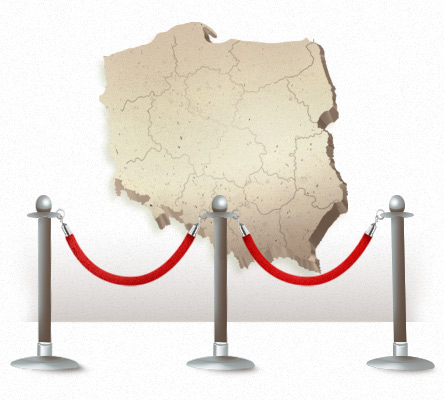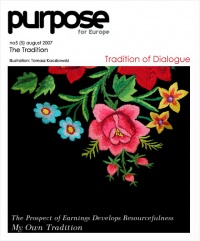
Feature
Dialogue tradition
I’m sorry to say that recently the word ‘tradition’ began to have very bad associations for me. It’s not that before I acted on the herd instinct and was particularly keen on all the “traditional” behaviours (traditional dishes, traditional rituals, traditional music, traditional literature, etc.) because I wasn’t at all. Nowadays however, when the wrongly understood tradition seems the only base of Polish national identity, I am fed up with all that.
I can’t help it if power and authority belong now to individuals whose “pro-Polishness” makes me sick. It’s a fact – Poland joined the structures of the European Union (a formation multicultural by definition) so those whose views on the world are based on paranoia may feel threatened. Quite recently I heard a speech by Roman Giertych - one of the leading Polish paranoiacs. It made me very sad for two reasons. Firstly, because I had never supposed that his raged ideology can be so absurd and grotesque. Secondly, my mood dropped when I heard the speaker who – his poor knowledge notwithstanding – could at least master the oratorical art (not to mention correct Polish pronunciation). Little Roman would like to be Roman the Great, but unfortunately he cannot. How sad.
I can’t help it if power and authority belong now to individuals whose “pro-Polishness” makes me sick. It’s a fact – Poland joined the structures of the European Union (a formation multicultural by definition) so those whose views on the world are based on paranoia may feel threatened. Quite recently I heard a speech by Roman Giertych - one of the leading Polish paranoiacs. It made me very sad for two reasons. Firstly, because I had never supposed that his raged ideology can be so absurd and grotesque. Secondly, my mood dropped when I heard the speaker who – his poor knowledge notwithstanding – could at least master the oratorical art (not to mention correct Polish pronunciation). Little Roman would like to be Roman the Great, but unfortunately he cannot. How sad.

illustration: Tomasz Kaczkowski
It is also sad that nationalists claim exclusivity to “Polishness”. They want to take over the whole Polish tradition and to have exclusiveness to speak in its name. They want to build national identity by negating Others, Strangers. I don’t even dare to imagine where such thinking can lead us.
One of the manifestations of “cherishing tradition and purity of the Polish spirit” was the last decision to exclude the works of Witold Gombrowicz from the canon of required reading. The decision has been widely publicised and is commonly known so it doesn’t make much sense to write about it in detail. Without doubt Gomrowicz was a writer whose views and opinions were far from ‘traditional’ and who believed in values different than those subscribed by the Minister of Education, so inferior to the famous author. However, shouldn’t the readiness for a dialogue and the ability to look at itself from some supranational perspective characterise every nation? Can any nation base its national identity solely on “God, Honour and Homeland”? And isn’t openness to anything different or strange one of the Polish (and, first of all, human) values? Shouldn’t traditional Polish hospitality be understood in this way – as a real encounter, tactful and full of understanding - and not as forceful moulding the Stranger after our own likeness – so that he becomes “one of us”?
Naturally, “tradition” doesn’t have to mean a xenophobic attitude to the world. Traditions change and so do identities as well as the ways they are established. We should always remember that. Perhaps today, when boarders get more and more widely open, when the fight against strangers has lost its raison d’etre, it doesn’t make any sense to pull out the “God, Honour, Homeland” banners? Under such circumstances Gombrowicz’s idea of homeland should be carefully considered instead of being pushed into the background of school discussions. Let’s recall the great Polish tradition that, in the past, created people ready to fight, to rise up and to shed their blood, but also open and able to discuss with what was different or unexplored. This is, I guess, the only way to make us intellectually rich.
One of the manifestations of “cherishing tradition and purity of the Polish spirit” was the last decision to exclude the works of Witold Gombrowicz from the canon of required reading. The decision has been widely publicised and is commonly known so it doesn’t make much sense to write about it in detail. Without doubt Gomrowicz was a writer whose views and opinions were far from ‘traditional’ and who believed in values different than those subscribed by the Minister of Education, so inferior to the famous author. However, shouldn’t the readiness for a dialogue and the ability to look at itself from some supranational perspective characterise every nation? Can any nation base its national identity solely on “God, Honour and Homeland”? And isn’t openness to anything different or strange one of the Polish (and, first of all, human) values? Shouldn’t traditional Polish hospitality be understood in this way – as a real encounter, tactful and full of understanding - and not as forceful moulding the Stranger after our own likeness – so that he becomes “one of us”?
Naturally, “tradition” doesn’t have to mean a xenophobic attitude to the world. Traditions change and so do identities as well as the ways they are established. We should always remember that. Perhaps today, when boarders get more and more widely open, when the fight against strangers has lost its raison d’etre, it doesn’t make any sense to pull out the “God, Honour, Homeland” banners? Under such circumstances Gombrowicz’s idea of homeland should be carefully considered instead of being pushed into the background of school discussions. Let’s recall the great Polish tradition that, in the past, created people ready to fight, to rise up and to shed their blood, but also open and able to discuss with what was different or unexplored. This is, I guess, the only way to make us intellectually rich.
Check the archive

nr 35 August 2007
theme of the issue:
THE TRADITION
< spis treści
Article
From the Editors
Presentation
Agnieszka Retko-Ruszczak
Culture Industries
Tradition and tourism - conversation with Tomasz Koralewski
Feature
Dialogue tradition - Kuba Wandachowicz
On the margin
My own tradition - interview with Wanda Balogh (Węgry)





